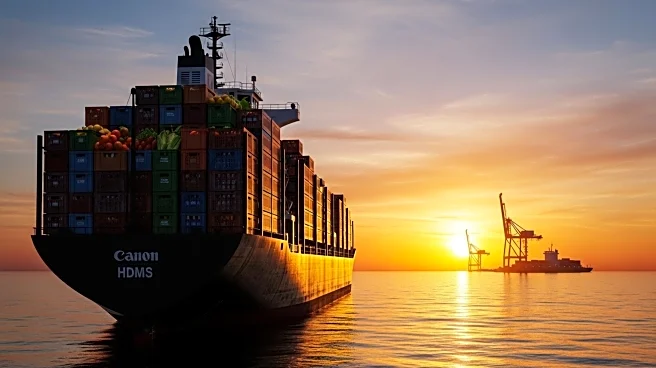What's Happening?
President Trump has implemented sweeping tariffs on various global markets, aiming to create jobs in the U.S., boost the economy, and increase tax revenues. However, these tariffs are causing U.S. food and drink exporters to seek alternative markets, notably China. Brazilian coffee exporters, facing a 50% U.S. import tax, are increasingly turning to China, which has become a significant market due to its growing cafe culture. This shift is seen as a response to the high tariffs imposed by Washington, which are making the U.S. less attractive for Brazilian exporters. Similarly, Indian exporters of tea and seafood are looking to China as a viable market due to the 50% U.S. tariff and additional penalties related to geopolitical tensions. These developments indicate a trend where exporters are diversifying their markets to mitigate the impact of U.S. tariffs.
Why It's Important?
The tariffs imposed by President Trump are reshaping global trade dynamics, particularly affecting U.S. exporters who are now seeking new markets. This shift could lead to increased trade between countries like Brazil, India, and China, potentially strengthening economic ties outside the U.S. The tariffs may also result in higher prices for American consumers, as import costs rise and domestic supply chains adjust. This situation highlights the broader implications of trade policies on international relations and economic strategies, as countries adapt to changing tariffs and seek to maintain their export levels.
What's Next?
As U.S. exporters continue to explore alternative markets, there may be further shifts in global trade patterns. Countries affected by the tariffs are likely to strengthen their trade relationships with China and other regions, potentially leading to long-term changes in export strategies. Additionally, ongoing trade negotiations and geopolitical developments could influence future tariff policies and international trade agreements. Stakeholders, including exporters and policymakers, will need to monitor these changes closely to adapt their strategies accordingly.
Beyond the Headlines
The tariffs not only impact economic relations but also raise questions about the ethical and strategic dimensions of trade policies. The move towards China by exporters could alter cultural exchanges and business practices, as companies adapt to new market demands. Furthermore, the geopolitical implications of these tariffs may influence diplomatic relations and international cooperation, as countries navigate the complexities of trade and political alliances.









